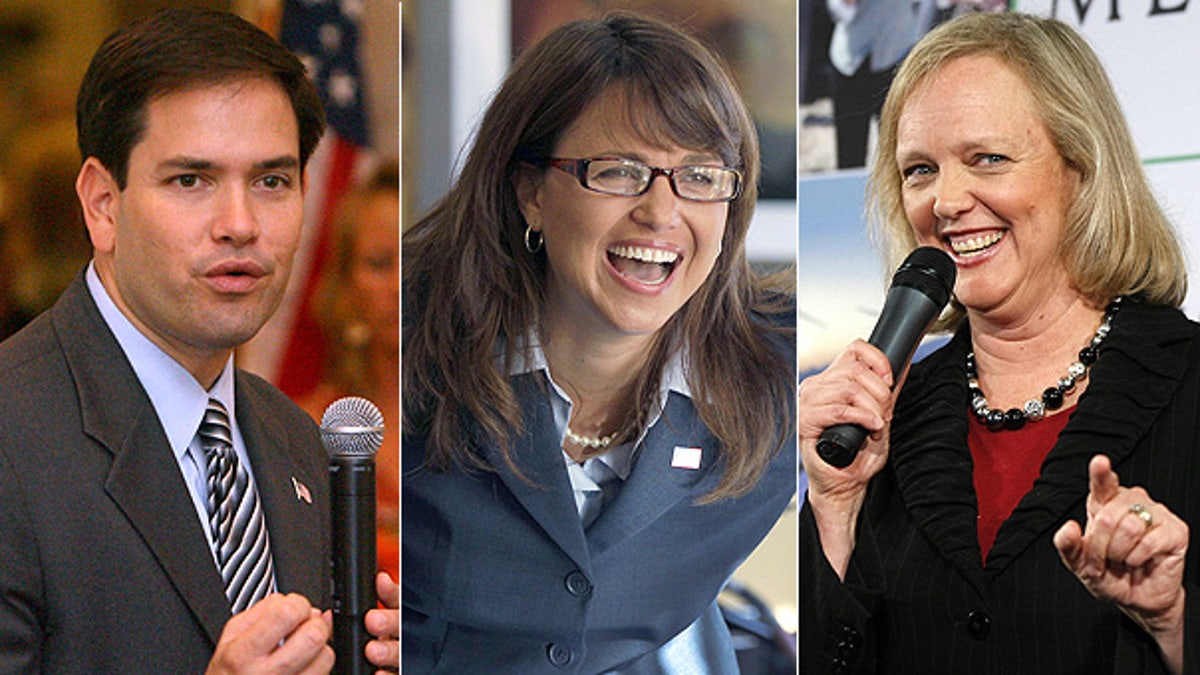
From left: Florida Republican Senate candidate Marko Rubio, Delaware Republican Senate candidate Christine O'Donnell, and California Republican Gubernatorial candidate Meg Whitman. (AP)
WASHINGTON -- The political environment has grown even more favorable for Republicans and rockier for President Obama and his Democrats over the long primary season that just ended with a bang.
With November's midterm congressional matchups set and the general election campaign beginning in earnest Wednesday, an Associated Press-GfK poll found that more Americans say the country is headed in the wrong direction than did before the nomination contests got under way in February. Also, more now disapprove of the job Obama is doing. And more now want to see Republicans in control of Congress rather than the Democrats who now run the House of Representatives and Senate.
Fueling voter anger is an unemployment rate that's hovered near 10 percent all year despite efforts by Obama and fellow Democrats to accelerate the economic recovery.
The country's pessimism benefits the out-of-power Republicans, which clearly has enthusiasm on its side. Far more people voted this year in Republicans primaries than in Democratic contests, and the antiestablishment tea party coalition has energized the Republicans even as it has sprung a series of primary surprises.
Said Senate Minority Leader Mitch McConnell: "Turnout and enthusiasm are off the charts."
In Delaware, a big turnout showed up to vote as tea party-backed Christine O'Donnell upset a moderate congressman for the Senate Republican nomination. By most accounts, the outcome diminished Republican chances of winning former Vice President Joe Biden's seat.
Republicans got their preferred candidate in New Hampshire as former state Attorney General Kelly Ayotte fended off a tea party-supported candidate by a razor-thin margin.
Overall, it's an extraordinarily dreary backdrop for Obama's beleaguered party. And with just seven weeks until Election Day, Democrats are running out of options to mitigate widespread expected losses of House, Senate and governor's seats from coast to coast on Nov. 2.
In the House, Speaker Nancy Pelosi predicted that the Democrats would keep control. But, underscoring the woes facing Democrats, she stopped short of the kind of confidence she's shown in past campaigns when her party had a political tail wind.
Republicans have steadily gained ground on economic issues and now have a slight advantage on handling the economy, the federal deficit and taxes. They improved their standing in the past month even as Obama stepped up his efforts to persuade the public to give Democratic solutions more time to work.
At the same time, 40 percent of likely voters call themselves supporters of the anti-tax, anti-establishment tea party movement, and most of them lean toward Republicans while nearly two-thirds have a deeply negative impression of Democrats. That means the opposition could be in strong shape on Nov. 2 if tea party backers turn out and vote Republican. That's what they've been doing so far this year: The movement can claim wins in at least seven Republican Senate races, a handful of Republican gubernatorial contests and dozens of House primary campaigns.
Also, Obama's job-performance standing on the economy is at a low point, and a majority of people now say they will consider their feelings about him when they vote for Congress this fall.
The House is most at risk of changing hands.
Upward of 75 races are competitive, most held by Democrats. Republicans need to gain 40 seats to seize control.
Most vulnerable are conservative-to-moderate Democrats in districts Sen. John McCain won in the 2008 presidential campaign, and other Democrats who rode Obama's coattails, benefiting from participation spikes among young and minority voters.
The opposition needs a 10-seat gain for Senate control, a tall order.
Republicans and Democrats alike say that quest got even more difficult Tuesday in Delaware when the conservative O'Donnell won the Republican nomination. Democrats had all but written off that Senate seat until O'Connell's win, and many Republicans agree it will be tough for her to pull off a November victory.
The Republicans are still virtually assured to pick up a North Dakota seat. Republicans also could overtake vulnerable incumbent Sens. Blanche Lincoln in Arkansas and Michael Bennett in Colorado, as well as Senate Majority Leader Harry Reid in Nevada. Among other Democratic-held seats: Republicans are leading comfortably in Indiana and Pennsylvania, and Republicans are competitive in Illinois, Connecticut, California, Washington, Wisconsin and West Virginia.
Republicans also have an advantage in states where they are defending seats they now hold that are coming open: Florida, Ohio, Kentucky, Missouri and New Hampshire.
With less than two months to go, Democrats are focused on slowing a Republican wave that could give the opposition control of Congress and on trying to fire up their deeply dispirited Democratic base while stemming the flood of independents who now are leaning strongly toward the Republicans.
For now at least, Republicans are simply selling themselves as something other than the status quo. And, if the antiestablishment results of the primary season are any measure, it may just work.
The AP-GfK Poll was conducted Sept. 8 to 13, 2010 by GfK Roper Public Affairs and Corporate Communications. It involved landline and cell phone interviews with 1,000 adults nationwide, and has a margin of sampling error of plus or minus 4.2 percentage points for all adults, 4.5 for registered voters and 5.7 for likely voters.

